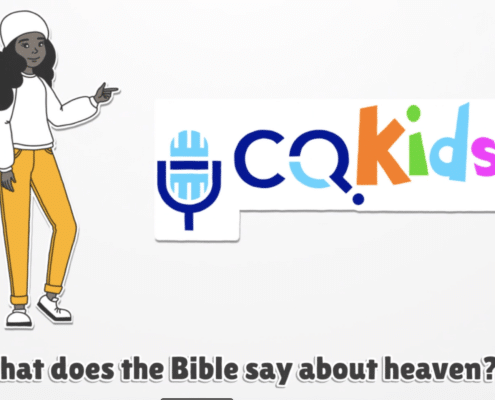VIDEO: What Does It Mean To Take God’s Name In Vain?
To not take God’s name in vain is about a lifestyle of genuine godliness. Watch this short vlog then listen to the full podcast of the same name for more details.
Related Videos

Is Mourning Out Loud Over Our Losses Good for Us?

VIEDO: Is Mourning Out Loud Over Our Losses Good for Us?

Does God’s Holy Spirit Speak to Us?

VIDEO: Does God’s Holy Spirit Speak to Us?

Have We Lost Our Ability to Honor One Another? (Part II)

VIDEO: Have We Lost Our Ability to Honor One Another? (Part II)

Have We Lost Our Ability to Honor One Another? (Part I)

VIDEO: Have We Lost Our Ability to Honor One Another? (Part I)

Can My Marriage Be a “Happily Ever After”?

VIDEO: Can My Marriage Be a “Happily Ever After”?

VIDEO: What are the different kinds of love in the Bible?

What Did Jesus Really Think of the Pharisees? (Part II)
Ep.1136: What Does It Mean to Take God’s Name in Vain?
Finding the deeper, more damaging meaning of misusing God’s name
If you do not have a password, please subscribe to our FREE Premium Content for the Full Edition version of CQ Rewind. The welcome message will contain your password, and a reminder will be sent each week when the CQ Rewind is available online for you to read, print, or download.
CHAPTERS
Theme Scripture: Exodus 20:7
Our society is so advanced we can access the world from the palm of our hand. It is so sophisticated we can communicate our thoughts globally in an instant. But it is so self-absorbed we can design a reality with our own ego at its center. In the ancient history of the Jewish nation, the third of the Ten Commandments said not to take God’s name in vain. We typically think of people using the name of God in a flippant, careless or disrespectful way as taking His name in vain. While this is true, it is NOT the point of the Commandment. On the contrary, all of what society has become presents a much more accurate picture of what taking God’s name in vain is all about. The fact is, it has become painfully easy to disrespect God. What should we be looking out for?
Taking God’s name in vain is not about words. That would be too shallow, and frankly, too easy. When we think about the Ten Commandments, we need to realize they were given to God’s chosen people as a primary guide for living. The first three are all about how His people were to perceive God and what God was to expect of them. The first commandment, to have no other gods in life but God himself, was about an internal decision of loyalty. The second, to not have any idols in one’s life, was about external actions of allegiance. The third, to not take God’s name in vain, was about a lifestyle of genuine godliness.
It's way more than just OMG
The phrase “take God’s name in vain” has the meaning of carrying the name of God as a label for your life in an empty or hollow way. It means you talk about upholding God’s name, but what you do does not fulfill your words. You are essentially leading others to see you as godly when in fact your priorities are far from God. To Israel it meant to live under the Law of God but not to live by the law of God.
To be blunt, taking God’s name in vain is to be a hypocrite. This is a serious charge. It is easy to look at biblical examples in both the Old and New Testaments and point out such hypocrisy. It is much harder to just stop, look in the mirror and start asking ourselves about how we personally handle God’s name. And how does our church handle God’s name?
Ten words of Jesus
Check out our July 27, 2020 podcast, “What Does It Mean to Take God’s Name in Vain?” for more. We examine several biblical examples of failure along these lines and look for lessons. We ask the hard questions about the details of our own lives as we cope with the godlessness of 21st century living. Most importantly, we look for solutions. We reveal ten words of Jesus that put this whole treatment of God’s name issue in perspective. Ten words of Jesus. Don’t you want to know what they are? Study the rest of the Commandments with us to see how they are still valid for Christians today.
Watch Our Episode Preview
Related Episodes

Is Mourning Out Loud Over Our Losses Good for Us?

VIEDO: Is Mourning Out Loud Over Our Losses Good for Us?

Does God’s Holy Spirit Speak to Us?

VIDEO: Does God’s Holy Spirit Speak to Us?

Have We Lost Our Ability to Honor One Another? (Part II)

VIDEO: Have We Lost Our Ability to Honor One Another? (Part II)

Have We Lost Our Ability to Honor One Another? (Part I)

VIDEO: Have We Lost Our Ability to Honor One Another? (Part I)

Can My Marriage Be a “Happily Ever After”?

VIDEO: Can My Marriage Be a “Happily Ever After”?

VIDEO: What are the different kinds of love in the Bible?

What Did Jesus Really Think of the Pharisees? (Part II)
VIDEO: Who was King Saul? (Part 2)
Parents and Bible class teachers, in Part 2, we learn about more mistakes that Saul made – but that’s good, because we can learn about what we should avoid through poor examples. Be sure to watch “Who Was King Saul? (Part 1),” then subscribe to our channel at ChristianQuestions.com/YouTube and never miss a new video!
Related Videos
 https://resources.christianquestions.com/wp-content/uploads/2024/04/23124330/Screenshot-2024-04-23-at-10.37.26%E2%80%AFAM.png
834
1618
Teresa Sutherland
https://resources.christianquestions.com/wp-content/uploads/2024/03/28151014/ChristianQuestions-Logo.png
Teresa Sutherland2024-04-22 00:00:112024-04-23 12:45:33VIDEO: What is generosity?
https://resources.christianquestions.com/wp-content/uploads/2024/04/23124330/Screenshot-2024-04-23-at-10.37.26%E2%80%AFAM.png
834
1618
Teresa Sutherland
https://resources.christianquestions.com/wp-content/uploads/2024/03/28151014/ChristianQuestions-Logo.png
Teresa Sutherland2024-04-22 00:00:112024-04-23 12:45:33VIDEO: What is generosity? https://resources.christianquestions.com/wp-content/uploads/2024/04/08133512/nehemiah-screen-shot.jpg
718
1275
Teresa Sutherland
https://resources.christianquestions.com/wp-content/uploads/2024/03/28151014/ChristianQuestions-Logo.png
Teresa Sutherland2024-04-18 00:00:082024-04-19 10:40:38VIDEO: Who was Nehemiah?
https://resources.christianquestions.com/wp-content/uploads/2024/04/08133512/nehemiah-screen-shot.jpg
718
1275
Teresa Sutherland
https://resources.christianquestions.com/wp-content/uploads/2024/03/28151014/ChristianQuestions-Logo.png
Teresa Sutherland2024-04-18 00:00:082024-04-19 10:40:38VIDEO: Who was Nehemiah?
How Can We Become Influencers? (Part II)

VIDEO: How Can We Become Influencers? (Part II)

Is Mourning Out Loud Over Our Losses Good for Us?

VIEDO: Is Mourning Out Loud Over Our Losses Good for Us?

Does God’s Holy Spirit Speak to Us?

VIDEO: Does God’s Holy Spirit Speak to Us?

Have We Lost Our Ability to Honor One Another? (Part II)

VIDEO: Have We Lost Our Ability to Honor One Another? (Part II)

Have We Lost Our Ability to Honor One Another? (Part I)

VIDEO: Have We Lost Our Ability to Honor One Another? (Part I)
VIDEO: Are Praise and Worship Necessary to Be a Faithful Christian?
What is the difference between worship and praise? Watch this short vlog then listen to the full podcast of the same name for more details.
Related Videos
 https://resources.christianquestions.com/wp-content/uploads/2024/04/23124330/Screenshot-2024-04-23-at-10.37.26%E2%80%AFAM.png
834
1618
Teresa Sutherland
https://resources.christianquestions.com/wp-content/uploads/2024/03/28151014/ChristianQuestions-Logo.png
Teresa Sutherland2024-04-22 00:00:112024-04-23 12:45:33VIDEO: What is generosity?
https://resources.christianquestions.com/wp-content/uploads/2024/04/23124330/Screenshot-2024-04-23-at-10.37.26%E2%80%AFAM.png
834
1618
Teresa Sutherland
https://resources.christianquestions.com/wp-content/uploads/2024/03/28151014/ChristianQuestions-Logo.png
Teresa Sutherland2024-04-22 00:00:112024-04-23 12:45:33VIDEO: What is generosity? https://resources.christianquestions.com/wp-content/uploads/2024/04/08133512/nehemiah-screen-shot.jpg
718
1275
Teresa Sutherland
https://resources.christianquestions.com/wp-content/uploads/2024/03/28151014/ChristianQuestions-Logo.png
Teresa Sutherland2024-04-18 00:00:082024-04-19 10:40:38VIDEO: Who was Nehemiah?
https://resources.christianquestions.com/wp-content/uploads/2024/04/08133512/nehemiah-screen-shot.jpg
718
1275
Teresa Sutherland
https://resources.christianquestions.com/wp-content/uploads/2024/03/28151014/ChristianQuestions-Logo.png
Teresa Sutherland2024-04-18 00:00:082024-04-19 10:40:38VIDEO: Who was Nehemiah?
How Can We Become Influencers? (Part II)

VIDEO: How Can We Become Influencers? (Part II)

Is Mourning Out Loud Over Our Losses Good for Us?

VIEDO: Is Mourning Out Loud Over Our Losses Good for Us?

VIDEO: What does the Bible say about heaven?

Does God’s Holy Spirit Speak to Us?

VIDEO: Does God’s Holy Spirit Speak to Us?

What Is the New Creation?

VIDEO: Why did Jesus wash the disciples’ feet?

VIDEO: What Is the New Creation?
Ep.1135: Are Praise and Worship Necessary To Be a Faithful Christian?
Understanding the roles and differences of praise and worship
If you do not have a password, please subscribe to our FREE Premium Content for the Full Edition version of CQ Rewind. The welcome message will contain your password, and a reminder will be sent each week when the CQ Rewind is available online for you to read, print, or download.
CHAPTERS
Theme Scripture: John 4:23
Christian praise and worship. As with many things subject to interpretation, you will find different applications of these things within the Christian community. For some, praise and worship are expressed in music. This drives their gatherings and feeds positive emotions towards God. For others, they include music and inspiration. They play a significant role in their gatherings as a focusing element for being open to God’s word. Others still have praise and worship in a smaller role. Who is right? Does it matter? Are these two parts of the same thing or are they entirely different? How do I know if I am paying enough attention to praising God? Am I living a life that expresses an attitude of worship?
So, what is worship anyway?
Is it reverently focusing on God while attending a service? Does worship thrive on emotions drawn from hymns and psalms being sung and recited with others? Is it a state of mind or a state of being? If you want to understand true Christian worship, you’d probably open your Bible to see what Jesus said about it. Surprisingly, when it comes to worship, Jesus never even mentioned it his followers. Not once! In fact, the only time he taught about worship was to a Samaritan woman while having a conversation at a well about what Jesus called “living water.”
In spirit and in truth
The Samaritan woman brings up the traditions of Samaritan worship of God in the mountain and the Jewish practice of worshipping God in Jerusalem. Jesus’ response is surprising to her and revealing to us. He tells her God’s true worshippers will now worship Him "in spirit and in truth." Jesus is saying that true connected worship of God will no longer be bound to any location. Because Jesus was here, worshiping God will now be different. After this conversation, Jesus never again teaches specifically about worship.
What are we supposed to do with this? Learn! The whole concept of worship is much bigger than many of us might think. While the Greek word means "to bow low," the New Testament application of this action applies to how we live. Understanding this will also give us a better sense of what it means to praise God.
Praise is another huge part of this conversation. While it is a deeply important aspect of our Christian lives, it too has a different look and feel than what we see in the Old Testament. Check out our July 20,2020 podcast, “Are Praise and Worship Necessary To Be a Faithful Christian?” for more. We set the firm foundation of what worship means on a daily basis to the Christian and then consider the role of praise. We address the similarities and differences of Old and New Testament praise and focus on its power in our lives. Our worship and praise can lift and encourage others while focusing us on fulfilling God’s will daily. Most important, our worship and praise can honor God. What’s better than that?
Watch Our Episode Preview
Related Episodes
 https://resources.christianquestions.com/wp-content/uploads/2024/04/23124330/Screenshot-2024-04-23-at-10.37.26%E2%80%AFAM.png
834
1618
Teresa Sutherland
https://resources.christianquestions.com/wp-content/uploads/2024/03/28151014/ChristianQuestions-Logo.png
Teresa Sutherland2024-04-22 00:00:112024-04-23 12:45:33VIDEO: What is generosity?
https://resources.christianquestions.com/wp-content/uploads/2024/04/23124330/Screenshot-2024-04-23-at-10.37.26%E2%80%AFAM.png
834
1618
Teresa Sutherland
https://resources.christianquestions.com/wp-content/uploads/2024/03/28151014/ChristianQuestions-Logo.png
Teresa Sutherland2024-04-22 00:00:112024-04-23 12:45:33VIDEO: What is generosity? https://resources.christianquestions.com/wp-content/uploads/2024/04/08133512/nehemiah-screen-shot.jpg
718
1275
Teresa Sutherland
https://resources.christianquestions.com/wp-content/uploads/2024/03/28151014/ChristianQuestions-Logo.png
Teresa Sutherland2024-04-18 00:00:082024-04-19 10:40:38VIDEO: Who was Nehemiah?
https://resources.christianquestions.com/wp-content/uploads/2024/04/08133512/nehemiah-screen-shot.jpg
718
1275
Teresa Sutherland
https://resources.christianquestions.com/wp-content/uploads/2024/03/28151014/ChristianQuestions-Logo.png
Teresa Sutherland2024-04-18 00:00:082024-04-19 10:40:38VIDEO: Who was Nehemiah?
How Can We Become Influencers? (Part II)

VIDEO: How Can We Become Influencers? (Part II)

Is Mourning Out Loud Over Our Losses Good for Us?

VIEDO: Is Mourning Out Loud Over Our Losses Good for Us?

VIDEO: What does the Bible say about heaven?

Does God’s Holy Spirit Speak to Us?

VIDEO: Does God’s Holy Spirit Speak to Us?

What Is the New Creation?

VIDEO: Why did Jesus wash the disciples’ feet?

VIDEO: What Is the New Creation?
VIDEO: Who was King Saul? (Part 1)
Saul started out “little in his own eyes” but that eventually changed and willful sins ensued. Parents and Bible class teachers, this short, animated video shows us a good example of behavior to avoid when we serve the Lord. Be sure to check out “Who was Saul (Part 2),” then subscribe to our channel at ChristianQuestions.com/YouTube and never miss a new video!
Related Videos
 https://resources.christianquestions.com/wp-content/uploads/2024/04/23124330/Screenshot-2024-04-23-at-10.37.26%E2%80%AFAM.png
834
1618
Teresa Sutherland
https://resources.christianquestions.com/wp-content/uploads/2024/03/28151014/ChristianQuestions-Logo.png
Teresa Sutherland2024-04-22 00:00:112024-04-23 12:45:33VIDEO: What is generosity?
https://resources.christianquestions.com/wp-content/uploads/2024/04/23124330/Screenshot-2024-04-23-at-10.37.26%E2%80%AFAM.png
834
1618
Teresa Sutherland
https://resources.christianquestions.com/wp-content/uploads/2024/03/28151014/ChristianQuestions-Logo.png
Teresa Sutherland2024-04-22 00:00:112024-04-23 12:45:33VIDEO: What is generosity? https://resources.christianquestions.com/wp-content/uploads/2024/04/08133512/nehemiah-screen-shot.jpg
718
1275
Teresa Sutherland
https://resources.christianquestions.com/wp-content/uploads/2024/03/28151014/ChristianQuestions-Logo.png
Teresa Sutherland2024-04-18 00:00:082024-04-19 10:40:38VIDEO: Who was Nehemiah?
https://resources.christianquestions.com/wp-content/uploads/2024/04/08133512/nehemiah-screen-shot.jpg
718
1275
Teresa Sutherland
https://resources.christianquestions.com/wp-content/uploads/2024/03/28151014/ChristianQuestions-Logo.png
Teresa Sutherland2024-04-18 00:00:082024-04-19 10:40:38VIDEO: Who was Nehemiah?
How Can We Become Influencers? (Part II)

VIDEO: How Can We Become Influencers? (Part II)

Is Mourning Out Loud Over Our Losses Good for Us?

VIEDO: Is Mourning Out Loud Over Our Losses Good for Us?

VIDEO: What does the Bible say about heaven?

Does God’s Holy Spirit Speak to Us?

VIDEO: Does God’s Holy Spirit Speak to Us?

What Is the New Creation?

VIDEO: Why did Jesus wash the disciples’ feet?

VIDEO: What Is the New Creation?
Ep.1134: What Did Jesus Teach Us About Money?
The uses, abuses, cautions and opportunities that money brings us
If you do not have a password, please subscribe to our FREE Premium Content for the Full Edition version of CQ Rewind. The welcome message will contain your password, and a reminder will be sent each week when the CQ Rewind is available online for you to read, print, or download.
CHAPTERS
Theme Scripture: Luke 12:15
Everybody needs money. Like it or not, it is one of the driving forces that contribute to a successful life. As Christians, we all know we need to be aware of how we handle our money. We also look to Jesus for the core values of our entire lives, so observing what he said about it is big. It has been said that 40 percent of Jesus’ parables had to do with money. While Jesus DID talk about it regularly, he wasn’t necessarily teaching about it more than anything else. Consider that in all of Jesus’ recorded experiences and teachings, we have NO example of Jesus ever having money or even touching it!
So, why would we want to learn about it from someone who never had any? Because he is Jesus! And because he holds the keys to eternal riches. He demonstrated exactly how it should be used and how to avoid becoming its slave!
Was Jesus Anti-Money?
At first glance, it could be easy to conclude that Jesus was an anti-money teacher. In Matthew 6:19 he emphatically taught us to not store up treasures on earth. He said such treasures were subject to being physically corrupted and spoiled. His point was that earthly treasure cannot hold its value in comparison to heavenly treasure. For a Christian, this should be a “mic drop” moment of reasoning. We simply cannot argue with this comparison. Does this mean Jesus was against money? Does it mean he was against saving for the future? Was he against owning property and having possessions?
No on all counts.
Regarding money and treasures, Jesus was teaching us to be heavenly focused while being earthly responsible. What does that mean? Let’s take the example of paying taxes, something we are all faced with. Because Jesus was the son of God and because his kingdom was not of this earth, he was a traveling preacher. Once his ministry began, he didn’t earn a living. Instead, he spent all of his time teaching and healing. When approached about paying the Temple tax to support the Jewish faith, he paid it. When asked about paying taxes to Rome, his simple answer was to give to Caesar what is his and give to God what is His. Jesus was showing us how to be heavenly focused while being earthly responsible.
Consistent on the Money Message
In Matthew chapter 6, Jesus continued his teaching about handling earthly money and treasures by laying out seven points of reference with which to build our approach. Check out our July 13, 2020 podcast, “What Did Jesus Teach Us About Money?” for more. We uncover these points of reference as we review several of Jesus other teachings regarding money. What we find is a remarkable consistency in his message. Jesus not only taught us much about fiscal responsibility, he also taught us powerful lessons regarding generosity and charity. Listen in and find out how to apply his ageless principles from the original source for Christian money management!
Watch Our Episode Preview
Related Episodes
 https://resources.christianquestions.com/wp-content/uploads/2024/04/23124330/Screenshot-2024-04-23-at-10.37.26%E2%80%AFAM.png
834
1618
Teresa Sutherland
https://resources.christianquestions.com/wp-content/uploads/2024/03/28151014/ChristianQuestions-Logo.png
Teresa Sutherland2024-04-22 00:00:112024-04-23 12:45:33VIDEO: What is generosity?
https://resources.christianquestions.com/wp-content/uploads/2024/04/23124330/Screenshot-2024-04-23-at-10.37.26%E2%80%AFAM.png
834
1618
Teresa Sutherland
https://resources.christianquestions.com/wp-content/uploads/2024/03/28151014/ChristianQuestions-Logo.png
Teresa Sutherland2024-04-22 00:00:112024-04-23 12:45:33VIDEO: What is generosity? https://resources.christianquestions.com/wp-content/uploads/2024/04/08133512/nehemiah-screen-shot.jpg
718
1275
Teresa Sutherland
https://resources.christianquestions.com/wp-content/uploads/2024/03/28151014/ChristianQuestions-Logo.png
Teresa Sutherland2024-04-18 00:00:082024-04-19 10:40:38VIDEO: Who was Nehemiah?
https://resources.christianquestions.com/wp-content/uploads/2024/04/08133512/nehemiah-screen-shot.jpg
718
1275
Teresa Sutherland
https://resources.christianquestions.com/wp-content/uploads/2024/03/28151014/ChristianQuestions-Logo.png
Teresa Sutherland2024-04-18 00:00:082024-04-19 10:40:38VIDEO: Who was Nehemiah?
How Can We Become Influencers? (Part II)

VIDEO: How Can We Become Influencers? (Part II)

How Can We Become Influencers? (Part I)

VIDEO: How Can We Become Influencers? (Part I)

If Jesus’ Resurrection Saved the World, Why Is It Such a Mess?

VIDEO: If Jesus Saved the World,Why Is It Such a Mess?

Is Mourning Out Loud Over Our Losses Good for Us?

VIEDO: Is Mourning Out Loud Over Our Losses Good for Us?

VIDEO: What does the Bible say about heaven?

Does God’s Holy Spirit Speak to Us?
VIDEO: What Did Jesus Teach Us About Money?
Jesus teaches us to be heavenly focused while being earthly responsible. Watch this short vlog then listen to the full podcast of the same name for more details.
Related Videos
 https://resources.christianquestions.com/wp-content/uploads/2024/04/23124330/Screenshot-2024-04-23-at-10.37.26%E2%80%AFAM.png
834
1618
Teresa Sutherland
https://resources.christianquestions.com/wp-content/uploads/2024/03/28151014/ChristianQuestions-Logo.png
Teresa Sutherland2024-04-22 00:00:112024-04-23 12:45:33VIDEO: What is generosity?
https://resources.christianquestions.com/wp-content/uploads/2024/04/23124330/Screenshot-2024-04-23-at-10.37.26%E2%80%AFAM.png
834
1618
Teresa Sutherland
https://resources.christianquestions.com/wp-content/uploads/2024/03/28151014/ChristianQuestions-Logo.png
Teresa Sutherland2024-04-22 00:00:112024-04-23 12:45:33VIDEO: What is generosity? https://resources.christianquestions.com/wp-content/uploads/2024/04/08133512/nehemiah-screen-shot.jpg
718
1275
Teresa Sutherland
https://resources.christianquestions.com/wp-content/uploads/2024/03/28151014/ChristianQuestions-Logo.png
Teresa Sutherland2024-04-18 00:00:082024-04-19 10:40:38VIDEO: Who was Nehemiah?
https://resources.christianquestions.com/wp-content/uploads/2024/04/08133512/nehemiah-screen-shot.jpg
718
1275
Teresa Sutherland
https://resources.christianquestions.com/wp-content/uploads/2024/03/28151014/ChristianQuestions-Logo.png
Teresa Sutherland2024-04-18 00:00:082024-04-19 10:40:38VIDEO: Who was Nehemiah?
How Can We Become Influencers? (Part II)

VIDEO: How Can We Become Influencers? (Part II)

How Can We Become Influencers? (Part I)

VIDEO: How Can We Become Influencers? (Part I)

If Jesus’ Resurrection Saved the World, Why Is It Such a Mess?

VIDEO: If Jesus Saved the World,Why Is It Such a Mess?

Is Mourning Out Loud Over Our Losses Good for Us?

VIEDO: Is Mourning Out Loud Over Our Losses Good for Us?

VIDEO: What does the Bible say about heaven?

Does God’s Holy Spirit Speak to Us?
VIDEO: How Should Christians Respond to Racism? (Part II)
Racism can’t be dealt with without wisdom. Watch this short vlog then listen to the full podcast of the same name for more details.
Related Videos
 https://resources.christianquestions.com/wp-content/uploads/2024/04/23124330/Screenshot-2024-04-23-at-10.37.26%E2%80%AFAM.png
834
1618
Teresa Sutherland
https://resources.christianquestions.com/wp-content/uploads/2024/03/28151014/ChristianQuestions-Logo.png
Teresa Sutherland2024-04-22 00:00:112024-04-23 12:45:33VIDEO: What is generosity?
https://resources.christianquestions.com/wp-content/uploads/2024/04/23124330/Screenshot-2024-04-23-at-10.37.26%E2%80%AFAM.png
834
1618
Teresa Sutherland
https://resources.christianquestions.com/wp-content/uploads/2024/03/28151014/ChristianQuestions-Logo.png
Teresa Sutherland2024-04-22 00:00:112024-04-23 12:45:33VIDEO: What is generosity? https://resources.christianquestions.com/wp-content/uploads/2024/04/08133512/nehemiah-screen-shot.jpg
718
1275
Teresa Sutherland
https://resources.christianquestions.com/wp-content/uploads/2024/03/28151014/ChristianQuestions-Logo.png
Teresa Sutherland2024-04-18 00:00:082024-04-19 10:40:38VIDEO: Who was Nehemiah?
https://resources.christianquestions.com/wp-content/uploads/2024/04/08133512/nehemiah-screen-shot.jpg
718
1275
Teresa Sutherland
https://resources.christianquestions.com/wp-content/uploads/2024/03/28151014/ChristianQuestions-Logo.png
Teresa Sutherland2024-04-18 00:00:082024-04-19 10:40:38VIDEO: Who was Nehemiah?
How Can We Become Influencers? (Part II)

VIDEO: How Can We Become Influencers? (Part II)

How Can We Become Influencers? (Part I)

VIDEO: How Can We Become Influencers? (Part I)

If Jesus’ Resurrection Saved the World, Why Is It Such a Mess?

VIDEO: If Jesus Saved the World,Why Is It Such a Mess?

Is Mourning Out Loud Over Our Losses Good for Us?

VIEDO: Is Mourning Out Loud Over Our Losses Good for Us?

VIDEO: What does the Bible say about heaven?

Does God’s Holy Spirit Speak to Us?
Ep.1133: How Should Christians Respond to Racism? (Part II)
Applying godly wisdom and intention to a destructive social issue
If you do not have a password, please subscribe to our FREE Premium Content for the Full Edition version of CQ Rewind. The welcome message will contain your password, and a reminder will be sent each week when the CQ Rewind is available online for you to read, print, or download.
CHAPTERS
Theme Scripture: Colossians 4:5-6
Racism does not happen by accident. It can be taught and exampled to young and unknowing hearts and minds. This is troubling. Even more troubling are the maladies of ignorance, prejudice and bigotry that must be present and flourishing to feed and sustain racist thinking and actions. As Christians, the mere thought of any of these things having a home in our hearts or minds should send shivers of distress and fear through our very souls. In Part I of our 2-part series on racism, we dissected ignorance, prejudice, bigotry and racism with the eyes of knowledge and the mind of understanding. Next we seek to look at them with godly wisdom and our highest godly intentions.
Wisdom. It is a simple word that carries a profound meaning. To be wise is to have knowledge, to understand that knowledge and to apply it. Wisdom’s application of knowledge reflects not merely a fact based righteousness. It reflects a compassion-driven character as well. Wisdom stands above the fray and is independent from emotion. When it comes to the racial tensions of our present day, wisdom is rarely called upon. Why? Why wouldn’t we want to follow wise and thoughtful perspective?
Justifiable emotion
Thomas Sowell, an American economist and social theorist once said, “The reason so many people misunderstand so many issues is not that these issues are so complex, but that people do not want a factual or analytical explanation that leaves them emotionally unsatisfied.” It's hard to imagine a more emotional topic than racism. When dealing with the potential of your entire race being relegated to the trash heap of inferiority, you get emotional. When you're being unjustly accused of devaluing the essential humanity of an entire race, you get emotional. All this emotion is justifiable... but should it be actionable? Should we gather with those of like reaction and hurt? Hide behind the walls of our frustration? Close the door of reasoned dialogue to those on the outside? No!
Enter wisdom
Wisdom has the courage to seek the thinking of others and listen. It has the tenacity to find the facts, wherever they may be hidden, and examine them in their entirety. It has the good sense to draw all this input together and conclude an integrity-based course of action. We cannot even begin to deal with racism without wisdom.
Check out our July 6, 2020 podcast, “How Should Christians Respond to Racism? (Part II)” for more. We seek the highest godly wisdom we can find in order to sort through this confusing and volatile pile of trouble. This podcast presents Ken's commentary. He is a black American man whose experiences and individual wisdom with racial profiling and prejudice provide needed insight. Observing the deep wisdom of Scripture, we study how the early Christian church dealt with serious racially-charged issues. We can learn to ease the racial tensions we face in our individual lives, but it requires working together!
Watch Our Episode Preview
Related Episodes
 https://resources.christianquestions.com/wp-content/uploads/2024/04/23124330/Screenshot-2024-04-23-at-10.37.26%E2%80%AFAM.png
834
1618
Teresa Sutherland
https://resources.christianquestions.com/wp-content/uploads/2024/03/28151014/ChristianQuestions-Logo.png
Teresa Sutherland2024-04-22 00:00:112024-04-23 12:45:33VIDEO: What is generosity?
https://resources.christianquestions.com/wp-content/uploads/2024/04/23124330/Screenshot-2024-04-23-at-10.37.26%E2%80%AFAM.png
834
1618
Teresa Sutherland
https://resources.christianquestions.com/wp-content/uploads/2024/03/28151014/ChristianQuestions-Logo.png
Teresa Sutherland2024-04-22 00:00:112024-04-23 12:45:33VIDEO: What is generosity? https://resources.christianquestions.com/wp-content/uploads/2024/04/08133512/nehemiah-screen-shot.jpg
718
1275
Teresa Sutherland
https://resources.christianquestions.com/wp-content/uploads/2024/03/28151014/ChristianQuestions-Logo.png
Teresa Sutherland2024-04-18 00:00:082024-04-19 10:40:38VIDEO: Who was Nehemiah?
https://resources.christianquestions.com/wp-content/uploads/2024/04/08133512/nehemiah-screen-shot.jpg
718
1275
Teresa Sutherland
https://resources.christianquestions.com/wp-content/uploads/2024/03/28151014/ChristianQuestions-Logo.png
Teresa Sutherland2024-04-18 00:00:082024-04-19 10:40:38VIDEO: Who was Nehemiah?
How Can We Become Influencers? (Part II)

VIDEO: How Can We Become Influencers? (Part II)

How Can We Become Influencers? (Part I)

VIDEO: How Can We Become Influencers? (Part I)

If Jesus’ Resurrection Saved the World, Why Is It Such a Mess?

VIDEO: If Jesus Saved the World,Why Is It Such a Mess?

Is Mourning Out Loud Over Our Losses Good for Us?

VIEDO: Is Mourning Out Loud Over Our Losses Good for Us?

VIDEO: What does the Bible say about heaven?

Does God’s Holy Spirit Speak to Us?
VIDEO: What is evil speaking?
The Bible says the tongue is like a fire – and a fire can be destructive (see James 3:6). Parents and Bible class teachers, this short, animated video discusses the details of evil speaking and why it is so harmful. Subscribe to our channel at ChristianQuestions.com/YouTube and never miss a new video!
Related Videos
 https://resources.christianquestions.com/wp-content/uploads/2024/04/23124330/Screenshot-2024-04-23-at-10.37.26%E2%80%AFAM.png
834
1618
Teresa Sutherland
https://resources.christianquestions.com/wp-content/uploads/2024/03/28151014/ChristianQuestions-Logo.png
Teresa Sutherland2024-04-22 00:00:112024-04-23 12:45:33VIDEO: What is generosity?
https://resources.christianquestions.com/wp-content/uploads/2024/04/23124330/Screenshot-2024-04-23-at-10.37.26%E2%80%AFAM.png
834
1618
Teresa Sutherland
https://resources.christianquestions.com/wp-content/uploads/2024/03/28151014/ChristianQuestions-Logo.png
Teresa Sutherland2024-04-22 00:00:112024-04-23 12:45:33VIDEO: What is generosity? https://resources.christianquestions.com/wp-content/uploads/2024/04/08133512/nehemiah-screen-shot.jpg
718
1275
Teresa Sutherland
https://resources.christianquestions.com/wp-content/uploads/2024/03/28151014/ChristianQuestions-Logo.png
Teresa Sutherland2024-04-18 00:00:082024-04-19 10:40:38VIDEO: Who was Nehemiah?
https://resources.christianquestions.com/wp-content/uploads/2024/04/08133512/nehemiah-screen-shot.jpg
718
1275
Teresa Sutherland
https://resources.christianquestions.com/wp-content/uploads/2024/03/28151014/ChristianQuestions-Logo.png
Teresa Sutherland2024-04-18 00:00:082024-04-19 10:40:38VIDEO: Who was Nehemiah?
How Can We Become Influencers? (Part II)

VIDEO: How Can We Become Influencers? (Part II)

How Can We Become Influencers? (Part I)

VIDEO: How Can We Become Influencers? (Part I)

If Jesus’ Resurrection Saved the World, Why Is It Such a Mess?

VIDEO: If Jesus Saved the World,Why Is It Such a Mess?

Is Mourning Out Loud Over Our Losses Good for Us?

VIEDO: Is Mourning Out Loud Over Our Losses Good for Us?

VIDEO: What does the Bible say about heaven?

Does God’s Holy Spirit Speak to Us?
Bible Study
Watch & Listen
Newsletter & CQ Rewind
Sign up for the CQ Newsletter and get the CQ Rewind Show Notes emailed each week as they become available, OR text to join:
Text CQREWIND to 22828.
This site uses cookies. By continuing to browse the site, you are agreeing to our use of cookies.
Accept settingsCookie and Privacy Settings
We may request cookies to be set on your device. We use cookies to let us know when you visit our websites, how you interact with us, to enrich your user experience, and to customize your relationship with our website.
Click on the different category headings to find out more. You can also change some of your preferences. Note that blocking some types of cookies may impact your experience on our websites and the services we are able to offer.
These cookies are strictly necessary to provide you with services available through our website and to use some of its features.
Because these cookies are strictly necessary to deliver the website, refusing them will have impact how our site functions. You always can block or delete cookies by changing your browser settings and force blocking all cookies on this website. But this will always prompt you to accept/refuse cookies when revisiting our site.
We fully respect if you want to refuse cookies but to avoid asking you again and again kindly allow us to store a cookie for that. You are free to opt out any time or opt in for other cookies to get a better experience. If you refuse cookies we will remove all set cookies in our domain.
We provide you with a list of stored cookies on your computer in our domain so you can check what we stored. Due to security reasons we are not able to show or modify cookies from other domains. You can check these in your browser security settings.
We also use different external services like Google Webfonts, Google Maps, and external Video providers. Since these providers may collect personal data like your IP address we allow you to block them here. Please be aware that this might heavily reduce the functionality and appearance of our site. Changes will take effect once you reload the page.
Google Webfont Settings:
Google Map Settings:
Google reCaptcha Settings:
Vimeo and Youtube video embeds:









